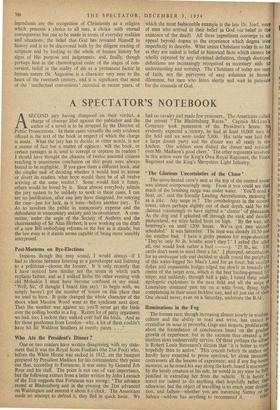A SPECTATOR'S NOTEBOOK
SECOND jury having disagreed on their verdict, a charge of obsceue libel against the publisher and the author of a novel is to be dropped by the Director of Public Prosecutions. In these cases virtually the only evidence offered is the text of the book in respect of which the charge is made. What the jury has to decide, in other words, is not a matter of fact but a matter of opinion : will the book, or certain passages in it, tend to corrupt or deprave its readers ? I should have thought the chances of twelve assorted citizens reaching a unanimous conclusion on this point were always bound to be negligible. If you gave them a different book, and the simpler task of deciding whether it would tend to amuse or divert its readers, what hope would there be of all twelve arriving at The same verdict ? Some would find it funny, others would be bored by it. Since almost everybody admits the jury system to be unlikely to work in these cases, I can see no justification, after one jury have disagreed, for retrying the case—just for luck, as it were—before another jury. To do so involves the public in unnecessary expense and the defendants in unnecessary anxiety and inconvenience. A com- mittee, under the aegis of the Society of Authors and the chairmanship of Sir Alan Herbert, is now working on the draft of a new Bill embodying reforms in the law as it stands; but the law even as it stands seems capable of being more sensibly interpreted.










































 Previous page
Previous page